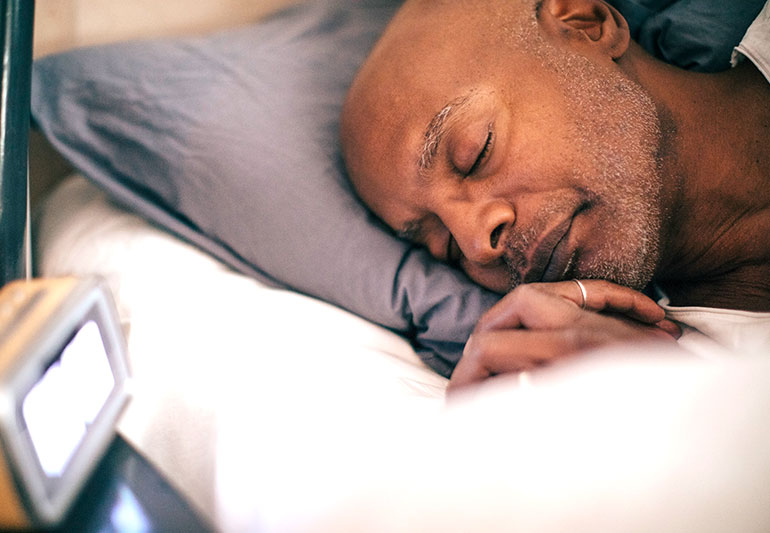If you struggle to fall asleep or find that you can’t get back to sleep when you wake up in the night, your sleep hygiene may need some work. If you suffer from anxious thoughts that run circles in your brain before bed or in the middle of the night, a mental shutdown routine can be helpful.
Protect Your Darkness
We often need to get up at night to use the bathroom. Consider putting a switched nightlight in your bathroom so you can see the minimum necessary, take care of your needs and get out of the bathroom and back to bed without turning on a lot of lights and waking up your brain. One white pillowcase can give you enough visibility to get back to bed.
For night owls, putting up room darkening shades can also be beneficial to extending your sleep to a healthy length of time. In addition to keeping your space dark, do make sure that your sleeping space is cool.
Keep Things Quiet
If you live in an apartment, you may be dealing with noises over which you have no control. However, within your own space, you can protect your sleeping environment by
- masking small percussive noises with white noise or a fan
- using a draft buffer under your door
- covering your windows with a lined foam drape
You may find that either you, your sleeping partner or your roommate add to the noise by snoring. Occasional snoring is not dangerous, but regular snoring can be hard on your heart and brain. If you have a family history of sleep apnea, you should consider getting a sleep study done.
Develop A Mental Shutdown Routine
If you learned to pray before bed as a child, or if a parent read to you before bed, you know the comfort of a bedtime routine. For those who struggle to fall asleep, a simple bedtime routine can start right after supper. Try to lower your stress by preparing for tomorrow; put out your clothes and make lunches for the next day.
Many like to wind down in front of the television. To improve your relaxation, clean up and put on your pajamas before you pick up the remote. Dim the lights in your lounge area and do your best to avoid electronic screens in the bedroom.
You may say prayers or ask for blessings for your loved ones when you snuggle into bed. Create a mantra or a thought process that you can easily memorize. When you wake in the night, start your mantra over. Your brain will go back into that mental shutdown process and make it easier to fall back to sleep.
Turn Your Clock Away From The Bed
Waking in the night can be frustrating. Frustration can cause a physical jolt of anger. Once you’re angry, your blood pressure goes up and you’re alert. Turn your clock to the wall and use your mantra to calm your brain back down. Time will march on; frustration and anger will do you no good.
Another option is to go ahead and put your alarm clock across the room and put something in front of it. If you wake and you need to get up, do what you need to do. If you’ve lost power and your clock is flashing, you will notice the flashing. If it’s not flashing, you don’t need to worry about the time.
Stay Hydrated
There are folks who will try to avoid getting up in the night by avoiding water before bed. This can lead to leg and foot cramps, as well as digestive troubles later. Waking up to leg cramps may actually leave you dreading bedtime.
It’s much safer to get up and use the bathroom than to get up and deal with a leg cramp. Do take care to clear your path to the bathroom; put up rugs to avoid slips or trips and make sure there are no tripping hazards between you and your goal.
A solid stretch of sleep can be incredibly relaxing. If you wake up exhausted, sleep apnea may be the culprit. Even if you don’t snore, you may have a hard time sleeping deeply for a long stretch of time. A sleep study could help you get better quality rest and improve your health long-term.











Leave a Reply